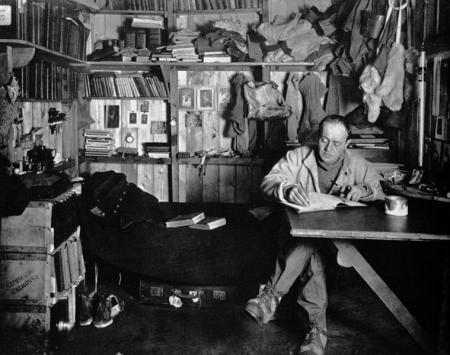英语听力万花筒 11 Scott of the Antarctic

A famous photograph of Scott, writing in his journal, at the expedition base camp.
Do you know what “centenary” means? It means the 100-year anniversary of something. This week is the centenary of the arrival at the South Pole of the first British explorers , led by Captain Robert Scott.
The English word “Arctic” means the area of the world around the North Pole. The Arctic is not land, but sea – frozen sea. However, the South Pole is in the centre of an icy continent, Antarctica, and 100 years ago Antarctica was still largely unknown. There had been expeditions to explore some of the coastal areas, and some of these expeditions had ventured inland. But the centre of the continent, and the South Pole itself, was unexplored. No-one had ever been there.
Robert Scott was born in 1868. He joined the Royal Navy at the age of 13. Over the years, he rose in rank, and became an expert in naval torpedoes. In 1899, he heard that the Royal Geographical Society in London planned to send an expedition to Antarctica. Although he had no previous experience of Antarctica, he was enthusiastic about the challenges of the expedition, and he volunteered to lead it.
The expedition left for Antarctica in July 1901, and spent two years in the frozen continent. It did some very useful scientific work, and a group led by Scott travelled far into the interior of Antarctica, to a point only 750 kilometres from the South Pole itself. But the extreme cold forced the party to turn back, and they returned to their base a month later ill and exhausted. The expedition had come to Antarctica with very little experience of cold climates. The explorers had to learn how best to travel over the ice and snow. They had brought dogs with them to pull their sledges, but they did not understand how to use the dogs effectively. Scott concluded that, although dog sledges could be useful, the only way that men could reach the South Pole was on foot, pulling sledges containing food and tents behind them.
The British government then decided that Scott’s expedition in Antarctica was costing them too much money, so two ships were sent out in 1903 to bring the explorers back to Britain. Scott returned home a popular hero. He was promoted to the rank of captain, and was invited to visit the King. He quickly decided to make a second expedition to Antarctica, and that this time he would reach the Pole. It took a long time, however, to find the money for the expedition, and a suitable ship, and to recruit the right people to go with him.
Scott’s second Antarctic expedition set out in 1910. Things did not go well. On the way to Antarctica, Scott received news that the Norwegian explorer Roald Amundsen was also on his way to the South Pole. Scott’s ship, the Terra Nova, became stuck in the ice for 3 weeks before it could reach land. He had brought ponies and motorised sledges with him to transport men and supplies, and a few dogs. One of the motorised sledges fell into the sea, as did several of the ponies. The ponies proved to be not very useful. Some of them died, and others had to be shot. Scott was now convinced that he was right – the only way to travel to the South Pole was to walk.
In November 1911, the journey south began. Over two months later, on 17 January 1912, Scott and four others at last reached the South Pole. They found a tent, and a Norwegian flag. Amundsen had beaten them. He had reached the Pole 5 weeks earlier. Scott’s party were heartbroken as they turned to go back to their base, 1300 kilometres away. The weather got worse and worse, and their supplies of food ran low. Cold and hunger sapped their strength. Two members of the party died on the journey. The remaining three men set up camp only 18 km from a depot where the expedition had left food and other supplies for them. They got no further, and all three died of cold on about 29 March.
Why did Amundsen win the race to the Pole? The main reason was that he had previously led an expedition to find a sea route through the North-West Passage, the frozen sea to the north of Canada. He had learned from the Inuit people of northern Canada that clothes made of animal skins were the only way to keep warm in very cold climates. He also learned how to use dogs to pull sledges, and the whole of his journey to the South Pole was accomplished with dogs. Scott had been wrong to think that the only way was to walk.
Nonetheless, Robert Scott remained a very popular national hero in Britain for many decades. Nowadays, experts are more critical of Scott’s failings, and about some of the decisions he took. But his courage, and the courage of his fellow explorers, is beyond doubt. We love brave, fearless heroes in England, particularly heroes who fail. Our national football team, and our tennis players, are just like Scott – brave, the best in the world, except that they don’t win.
- 频道推荐
- |
- 全站推荐
- 推荐下载
- 网站推荐




















